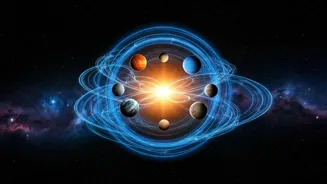Nine Goddesses, Nine Planets
Navratri, a significant Hindu festival, is a time to honor the nine forms of Goddess Durga. Each form represents a different archetype and energy, mirroring
the influences of the nine planets (Navagrahas) in astrology. The celestial bodies have an impact on the karmas, fortunes, and spiritual development of individuals. Worshipping the Navadurga enables planetary influences to harmonize, fostering balance and prosperity.
Shailputri: Moon's Embrace
On the first day, Shailputri is venerated. As the "daughter of the mountains," she embodies stability, purity, and the Moon's influence. In astrology, the Moon influences emotions and the mind. Those who seek peace and mental clarity, especially in times of confusion, often turn to Shailputri. Worshipping this form is believed to bring fortitude and conscious clarity.
Brahmacharini: Mars' Power
The second day is dedicated to Brahmacharini, symbolizing austerity, penance, and self-discipline. She is associated with Mars, the planet of energy, bravery, and will. Devotees seek her blessings for focus, will, and success in their academic or professional endeavors. Brahmacharini is believed to mitigate impulsiveness and aggression, often related to the energy of Mars.
Chandraghanta: Venus' Grace
The third day honors Goddess Chandraghanta, who embodies grace, beauty, and courage. Associated with Venus, the planet of love, luxury, and relationships, worshipping her is believed to dispel discord and help unite families. It also attracts both material and spiritual wealth to devotees.
Kushmanda: Solar Radiance
On the fourth day, Kushmanda is honored. She created the universe with her smile and represents vitality, creativity, and the Sun. The Sun represents the soul and life-sustaining energy. Worshipping Kushmanda is believed to bring strength, self-confidence, and health while mitigating the negative impacts of a weak Sun in one's astrological chart.
Skandamata: Mercury's Wisdom
The fifth day is dedicated to Skandamata, who carries Kartikeya (Skanda) on her lap. She represents motherhood, compassion, and wisdom. Associated with Mercury, the planet of intelligence and communication, those who worship Skandamata seek wisdom, clarity in decision-making, and effective communication.
Katyayani: Jupiter's Justice
On the sixth day, the warrior goddess Katyayani is revered. She embodies courage, justice, and the removal of evil. Associated with Jupiter, the planet of wisdom, morality, and spirituality, worshipping Katyayani helps strengthen morals, gain divine knowledge, and overcome challenges in one's professional life.
Kaalratri: Saturn's Discipline
The seventh day sees devotion to Kaalratri, the "Fierce Goddess," who eliminates darkness, ignorance, and delusion. She is associated with Saturn (Shani), the planet of discipline, karma, and endurance. Worshiping Kaalratri diminishes the difficulties of Saturn's challenging periods, endows the devotee with endurance, and protects against evil spirits and negative energies.
Mahagauri: Rahu's Purification
The eighth day celebrates Mahagauri, the aspect of pure, peaceful, and calm energy. She is paired with Rahu, a shadow planet linked to illusions and sudden change. Seeking Mahagauri's blessings is about purifying emotional thinking, cleansing oneself from materialism, and being released from karmic burdens.
Siddhidatri: Ketu's Spirituality
The last day honors Siddhidatri. This goddess grants siddhis (spiritual powers) and ultimate perfection. Connected to Ketu, the planet of detachment and spirituality, Siddhidatri offers wisdom to the ignorant and guides seekers toward self-realization. Thus, Navratri becomes a potent confluence of the divine and the cosmic, a true cosmic opportunity for transformation.















